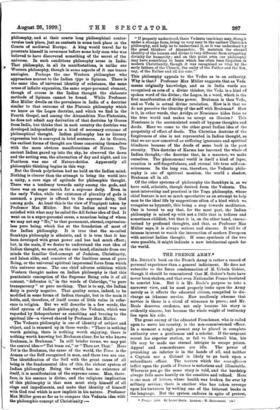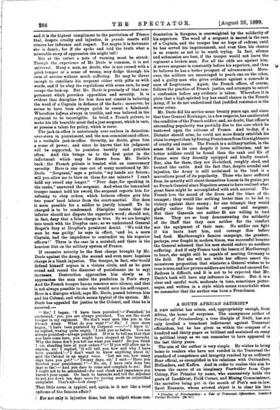THE FRENCH ARMY.*
Mn. DECLE'S book on the French Army is rather a record of personal experience than a general indictment. He does not subscribe to the fierce condemnation of M. Urbain Gohier, though it should be remembered that M. Gohier's facts have never been shaken, and that even Nationalist France hesitated to convict him. But it is Mr. Decle's purpose to take a narrower view, and he most properly looks upon the Army merely as it affects the educated citizen, compelled to dis- charge an irksome service. How needlessly irksome that service is there is a cloud of witnesses to prove; and Mr. Decle deserves credence, not only because his story is evidently sincere, but because the whole weight of testimony lies upon his side.
The great enemy of the educated Frenchman, who is called upon to serve his country, is the non-commissioned officer. In a moment a rough peasant may he placed in complete authority over a gentleman and a scholar. If the sergeant resent his superior station, or fail to blackmail him, his life may be made one eternal intrigue to escape prison. Appeal and remonstrance are idle. The power of punishing an inferior is in the hands of all, and neither a Captain nor a Colonel is likely to go back upon a subordinate officer. The torture which the sous-aficiers inflict upon the youth of France is notorious and illimitable. Wherever you go the same story is told, and the hardship always falls more heavily on the sensitive and refined. Here is one man of letters, whose health was broken for ever by military service ; there is another who has taken revenge upon his torturers by writing one of the bitterest books in the language. But the system endures in spite of protest,
• Trool.■,. J,S0). By Liimel Decle. London : W. Heinemann. [6a.1
and it is the highest compliment to the patriotism of Fiance that, despite cruelty and injustice, la grande inuette still retains her influence and respect. Yet maybe it is fortunate she is dumb; for if she spoke and told the truth what a miserable story of oppression she might tell !
But at the outset a note of warning must be struck. Though the experience of Mr. Decle is common, it is not iniveres.l. Many a man, no doubt, who is not cursed with a pick temper or a sense of wrong, may dodge through his term of service without much suffering. He may be clever snough to conciliate his sergeant either with gifts or with words, and if he obey the regulations with some care, he may escape the lock-up. But Mr. Decle is precisely of that tem- perament which provokes opposition and severity. It is evident that discipline for him does not consist in believing the word of a Captain in defiance of the facts ; moreover, he seems to have been always quick to resent a falsehood. Wherefore he:wee always in trouble, and was believed in the regiment to be incorrigible. In brief, a French private, to make his life bearable must find a just sergeant, which is rare, or possess a talent for policy, which is rarer.
The jack-in-office is notoriously over-zealous in detection, over-stern in punishment, and the non-commissioned officer, is a veritable jack-in-office. Severity, no doubt, gives him a sense of power; and since he knows that his judgment will be supported, he punishes harshly and punishes often. And this brings us to the first point in the indictment which may be drawn from Mr. Decle's book : the French private is treated with an unnecessary severity. Here is one case out of many mentioned by Mr. Decle. "Sergeant," says a private, "my hands are frozen ; will you allow me to blow on them for one minute ? I can't hold my sword any longer." " Four days,for speaking in the ranks," answered the sergeant. And when the benumbed trooper cannot hold his sword, the sergeant reports him for refusing to obey orders, which heinous offence gets him two years' hard labour from the court-martial. Nor does it seem possible for a soldier to justify himself. To be charged is to be condemned. Discipline insists that the inferior should not dispute the superior's word ; should not, in fact, deny that a false charge is true. So we are brought into touch with the Dreyfus case; so we understand General Roget's fury at Dreyfus's persistent denial. ' We told the man he was guilty,' he says in effect, and he, a mere Captain, had the impudence to contradict us, his superior officers !' There is the case in a nutshell, and there is the heaviest blot on the military system of France.
If excessive severity be the first charge brought by Mr.
Decle against the Army, the second and even more hopeless charge is a blank injustice. The trooper, in fact, who'would defend himself argues in a vicious circle, and as he goes round and round the diameter of punishment (so to say) increases. Destruction approaches him slowly as it approaches the man under the pendulum in Poe's story. And the French trooper has no resource save silence, and that is not always possible to one who would save his self-respect. Here is a dialogue which, says Mr. Decle, passed between him and his Colonel, and which seems typical of the system. Mr. Decle has appealed for justice to the Colonel, and thus he is received :—
" ' Sir,' I began, 'I have been punished.'—' Punished,' he exclaimed, yes, you are always punished. You are the worst trooper in my regiment. We don't want men like you in the French Army. What do you want ?'—' Sir,' I once more
began, 'I have been punished by Corporal I know it,' he replied, waxing quite angry, I told you so before. You are always punished—always punished. If it is to tell me that that you have come here, you might have stopped at the barracks. Why the deuce don't you tell me what you want? Do you think I am standing here at your orders ?'—' If you will allow me to explain, sir,' I replied, 'It will tell you how and why I have been punished.'—` I don't want to know anything about it,'
said the Colonel in an angry voice. Let me see, how many days have you got?'—` Twenty days. sir,' I said.—'Have you finished your punishment ? No, sir, I have only done two days so far.'—' And you dare to come and complain to me! But 1 ought not to be astonished—for cool cheek and impudence you haven't your equal. Go back to barracks and tell the Adjutant to put you down ten days more for having made an unjustified complaint. That's all—look sharp ! '"
That little scene is typical, and, again, is it not like a brief epitome of the famous affair?
• Prinsloo of Prinsloosdarp: For not only is injustice done, but the culprit whose con. Dunbar Brothers. [ts. W.]
demnation is foregone, is overweighted by the solidarity of his superiors. The word of a sergeant is sacred in the ears of a Captain, and the trooper has no hope of redress, until he has served his imprisonment, and even then his chance is so remote as not to be worth trying. In fact, silence
and submission are best, if the trooper would not leave the regiment a broken man. For all the odds are against him. A severe sergeant is constantly before his superiors, and thus he believes he has a better prospect of advancement. More- over, the soldiers are encouraged to peach one on the other, and a guilty man who gives evidence against a comrade is sure of forgiveness. Again, the French officer, of course, follows the practice of French justice, and attempts to extort a confession before any evidence is taken. Wherefore it is plain that a high-spirited boy has small chance in the French Army, if he do not understand that justified resistance is the worse crime.
Mr. Decle did his service some twenty years ago, and since that time General Boulanger, in a few respects, has ameliorated the condition of the French soldier, and, no doubt, that officer's astounding popularity was partially due to the care which he bestowed upon the citizens of France. And to-day, if a Dictator should arise, he could not more firmly establish his claim to respect than by freeing Frenchmen from this nightmare of cruelty and insult. The French is a military'nation, in the sense that in its own despite it loves militarism, and no better soldiers could be found than the rank and file of France were they decently equipped and kindly treated. But, alas for them, they are ill-clothed, roughly shod, and treated like cattle. And the fact that, despite scandal and injustice, the Army is still acclaimed in the land is a marvellous proof of its popularity. Those who have suffered from its severity still shout themselves hoarse in its praise, yet no French General since Napoleon seems to have realised what great feats might be accomplished with such material. The French love the sound of the drum and the blare of the trumpet ; they would like nothing better than to be led to victory against their enemy ; for one triumph they would gladly endure the insults of corporal and sergeant. But their Generals are neither fit nor willing to lead them. They are so busy demonstrating the solidarity of the Staff that they care neither for the comfort nor the equipment of their men. No soldier can fight if his boots hurt him, and courage flies before bad food. Marlborough's famous campaign, the greatest, perhaps, ever fought in modern times, was successful because the General schemed that his men should endure no needless suffering. And if only France took the lesson of Marlborough to heart, she might still be capable of meeting Germany in the field. But she will not while her officers assert the monstrous proposition that whatever a General wishes to be true is true, and her private soldiers are bullied and uncared for. Redress is difficult, and it is not to be expected that Mr. Decle's book will have any influence in France. But it is a clear and careful work, moderate in tone, sometimes pictur- esque, and written in a style which seems remarkable when we remember that the author was born a Frenchman.



































 Previous page
Previous page